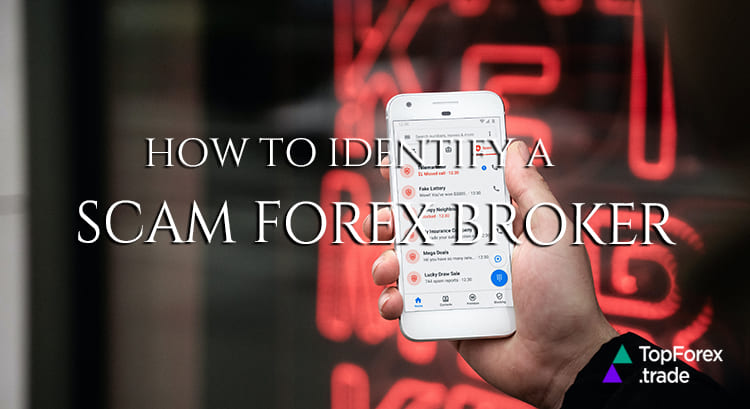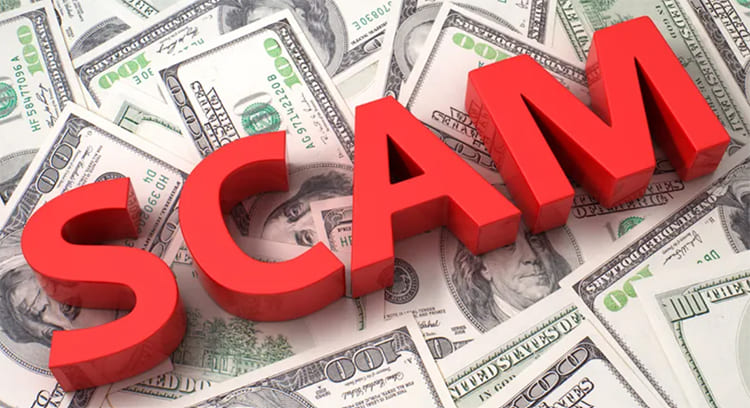Is your Forex broker safe? All you need to spot a scammer

Although there are numerous reputable online Forex brokers regulated by the world’s strictest financial authorities that you can choose as your best-suited trading platform, you may also come across ones that are nothing more than a scam.
These scam brokers make money by attracting traders with the promise of guaranteed earnings, only to charge them exorbitant fees, profit from their trading activity, and skim funds from their accounts until the traders realize their mistake and try to cash out.
If you’re searching for the best forex broker online or are suspicious of your current trading platform, here are some warning signs that your Forex broker is a scam and tips on how to deal with it.
Major types of Forex fraud

Advertising links Forex scams
This type of Forex scam can be found in website advertisements or on SNS platforms like Facebook or Instagram. They are frequently accompanied by photographs of well-known business or entertainment figures who have almost never authorized the use of their image. These images are used because they subconsciously arouse curiosity, causing the viewer to click and learn more.
Another strategy used in these marketing schemes is the “from poverty to wealth” narrative, which uses visuals to tell the story of someone who once struggled to make ends meet but is now living their best thanks to great Forex returns.
Phone call Forex scamming
Receiving random phone marketing calls (aka “cold calls”) selling everything from vacation packages to TV subscriptions is now standard practice for anyone with a phone.
Despite the fact that many of these calls end with a polite “I’m sorry, I’m not interested right now,” an average of 1% to 4% of these calls are successful, and this small percentage is enough to keep the practice going.
In general, a Forex phone scam will try to get your attention right away – within seconds, the caller will either present an opportunity to deposit little and make a lot of money or to introduce themselves as a professional trading consultant representing a Forex broker. Although some of these calls could be legitimate, the vast majority are Forex scams.
Email/WhatsApp/SMS Forex scamming
Email, SMS, and WhatsApp messages from dishonest brokers are becoming increasingly common, similar to Forex phone scams. Once again, it is essential to remain vigilant in the face of any unsolicited messages, regardless of format.
Warning signs of scam brokers

When getting into Forex trading, it’s crucial to identify brokers who are trustworthy and viable and to avoid those who are not. Before depositing a large amount of capital in your new account, check them through a series of fraud signs to separate reputable companies from those with shady dealings:
- You were not looking for them.
Proceed with caution if you are repeatedly contacted by an FX broker company that you haven’t personally contacted. It is always preferable to seek information from acquaintances or trusted sources rather than responding to an unsolicited message or phone call;
- They are being pushy.
Scammers use more coercive and aggressive tactics than reputable brokers. They generally do not respond to requests to end contact and will use various persuasive techniques to do everything in their power to persuade you to spend your money;
- They charge excessive fees.
Every brokerage establishes its fee schedule, but the Forex broker scam attempts to drain traders of additional funds through hidden fees and other cheap tactics. If you’re new to forex trading, you may be completely unaware that a broker’s fees exceed those of competing platforms. As a result, it’s critical to always compare prices between forex trading platforms before deciding which one to use. While they may appear minor on a fee sheet, high fees will eat away at your profits over time.
- Their trading conditions are too different from market standards.
Of course, they may vary from broker to broker as well as companies can run client-friendly promo campaigns. Yet, too high promised returns or extra wide spreads are a red flag: the Forex market is driven by demand and supply and volatile, so no returns can be “guaranteed”.
- There are no disclaimers stating the inherent risk.
Risk is always present in the Forex trade, and your broker should be aware of it. Reputable brokers will make certain that new traders understand that trading on the platform may result in them losing money rather than increasing their income.
Reputable Forex brokers have nothing to lose by ensuring that their clients are aware of the risks associated with their activities. Scam Forex brokers do not want you to be aware of these risks as they are only concerned with generating as much trading activity as possible to maximize their profits.
- Their “Terms of Use” are too complicated.
Forex scammers use complicated terminology and lengthy terms of use agreements and risk disclosures. The significance of these agreements is that they are legally binding, and each clause can conceal disadvantages for users, who may have to seek alternative means of recovering trading losses.
- Poor customer service.
Is it difficult to contact a customer service representative when you have a question? Is the broker eager to address your concerns, or do you get the cold shoulder and/or the runaround?
Poor communication is sometimes simply a sign of poor customer service. However, it may also serve as proof that your broker is only interested in making money off of you. Scam brokers will not expend any resources to ensure that you are satisfied with your customer experience. Legitimate brokers, on the other hand, value you as a customer and will go out of their way to address any concerns or questions you may have.
If you answered “yes” to at least one of these criteria by checking through the broker, better to be extra-cautious and make a more profound background search or pick among the globally famous brokers reviewed at the end of this article: they deserve a trust credit with their decades of operation in the market, millions of clients around the world, and the fact that they hold not just one, but multiple regulative licenses.
How do you check if your FX broker is regulated?

New traders who want to open their first FX accounts are usually the most vulnerable to scams: many unlicensed brokers are looking for ways to get their hands on their money. They’ve devised novel methods to lure their victims into their traps. As a result, new traders must understand how to tell if an offer for a Forex account comes from a regulated Forex broker.
The majority of financial authorities now require their fellow Forex brokers to prominently display their license numbers on their websites. This should be done prominently rather than in an obscure corner of the website where it is likely to be overlooked. Forex brokers, for example, are classified as Australian Financial Services companies and must have an AFSL number (Australian Financial Services License no).
Internal search engines on some Forex regulators’ websites allow users to look up a broker’s status. If a trader enters the name of a Forex brokerage and specifies that it is regulated and licensed, the broker’s information and standing will be displayed.
Some Forex regulators issue periodic warnings about the activities of scam brokers.
There are also FX regulatory agencies that keep an up-to-date broker blacklist that contains the names of brokers whose licenses have been suspended or revoked, or whose cases against them have been proven beyond a reasonable doubt.
How to avoid scam Forex brokers

It is ideal to protect yourself from shady brokers in the first place. The following 5 steps should be helpful if you have just started your journey as a Forex trader:
- Look up the broker’s background information. How much information can you glean about them? The broker must provide information such as the company’s name, registration date and location, and legal address. Is the website shady or professional? The trading platform’s low quality is also a red flag; check it out first by opening a trading demo account.
- Research the broker reviews. Check for any complaints concerning being unable to withdraw funds. If there are any, contact the user and inquire about their experience.
- Make sure to read all the fine print, when opening an account. When attempting to withdraw funds, incentives to open an account are frequently used against the trader. Reading the fine print will ensure that you understand all contingencies in these situations.
- Don’t let a “fear of missing out” (FOMO) get to you. There can be a lot of pressure, especially in the Crypto community, to seize opportunities as soon as possible, but you should always take your time and do your research. Never feel obligated to deposit your money somewhere simply because everyone else is. If an influential person suddenly begins hyping up a new asset or platform, proceed with caution as there is a good chance it is a scam.
- Start trading with a demo account. Then open a real one and deposit only small amount of capital. If you are content with your research on a particular broker. If everything has gone well, depositing more funds should be relatively risk-free. If you have issues, try to work them out with the broker. If that doesn’t work, move on and post a detailed report of your experience online so that others can learn from it.
Top regulated Forex brokers
In conclusion, the efforts of FX regulatory bodies, brokers’ long history of operation, absence of aggressive advertising, and guaranteed returns are the major metrics to ensure brokers’ sanctity and avoid fraud.
Global Forex regulation aims to level the playing field for all participants. Many retail traders today trade with Forex brokers based in countries other than their own, preferring international firms with millions of clients around the world.
Forex brokers we recommend and review on our website have been serving their customers for decades and meet the stringent criteria of the global financial authorities. They have the best selection of currency pairs, as well as other financial instruments such as stocks, indices, and Cryptocurrencies, and some of the best trading conditions, such as Forex bonuses of up to $5000 even on initial deposits (subject to geographic availability), Copy trading, and negative balance protection. Even more than that, they are compatible with the most renowned VPN providers for Forex trading and some of them offer free VPS services on certain types of accounts.
Plus500 CFDs trading
Plus500 is a great option for traders. The platform offers stop-loss and stop-limit tools, as well as a wide range of CFDs for currency pairs, indices, commodities, Cryptocurrencies, stocks, and ETFs.
The trading terminal of the broker is available in a web version for PCs and laptops, as well as an Android and iOS mobile app. Bank transfers, credit and debit cards, and e-wallets are also accepted for deposits and withdrawals.
CySEC, FCA, ASIC, and other authorities fully regulate and license the broker, allowing it to accept clients from all over the world.
82% of retail investor accounts lose money when trading CFDs with this provider. You should consider whether you can afford to take the high risk of losing your money.
eToro Forex trading
eToro is a well-known brokerage company all over the world, and it is likely the most popular in Europe, thanks to its favorable trading conditions, which include the availability of over 2,000 financial instruments, including CFDs, stocks, and 59 Cryptocurrencies, as well as the ability to use CopyTrader – Social trading tool, which allows you to automatically copy deals of other eToro users. Simply sign up for the trader and enter the amount you want to put into your portfolio.
The working terminal is easy to use and supports both the web version and the Android and iOS mobile apps. Furthermore, two account types will allow you to choose the best scenario for you.
The broker also holds an impressive number of credentials. It is regulated by the FCA (UK), ASIC (Australia), and CySEC (Cyprus/Europe), for example, which has helped it earn the trust of millions of traders worldwide.
HF Markets Forex trading
HF Markets (formerly known as HotForex) is a well-known broker that provides a variety of accounts for a variety of purposes, including Micro, Premium, Fixed, VIP, and Zero Spread accounts. Forex Gold Trading offers the most competitive spreads and no hidden commissions, allowing you to trade in over a thousand different trading products.
The well-known financial terminals MT4 and MT5 are available for Windows, iOS, macOS, and Android in desktop, web, and mobile versions. The addition of a VPS service and the HFcopy trading platform will also be beneficial. The latter will assist beginners by imitating professionals, while experienced traders will be rewarded for their efforts.
In terms of regulation, HF Markets has a presence in the EU and operates in accordance with CySEC, as well as in the UK under the direction of the FCA and in Dubai under a DFSA license.
AvaTrade Forex trading
AvaTrade is a broker that connects over 20000 retail traders from 150 different countries with currently operating regional offices in France, Australia, Japan, and Italy, and its headquarters in Dublin, Ireland. All regulations are followed by the broker, who is licensed by MiFID, ASIC, Japan FSA and FFA, FSB, IIROC, and FSCA.
Traders can buy and sell 1250 instruments on a variety of trading platforms, including MetaTrader 4, MetaTrader 5, Proprietary, AvaSocial, AvaTradeGo, AvaOptions, and WebTrader. AvaTrade mobile trading is for you if you are a frequent trader who does not want to be tied to a computer.
XM Group Forex trading
XM Group is an ASIC, CySEC, IFSC, and DFSA-regulated Forex broker that provides MT4 and MT5 terminals with a VPS server for non-stop trades and advisors.
All known assets, such as currency pairs, commodities, equities, CFDs, and many more, are included in the list of broker instruments. Clients can choose between Micro, Standard, XM Ultra Low, and Shares accounts, all of which include negative balance protection and tight spreads. Furthermore, the broker provides a demo account that replicates all of the functions of a real account for beginner traders who would like to gain some practical experience.
It may appear to be a lot, but the good news is that you are not limited to working with just one broker. Most of the reputable Forex brokers we mentioned above offer demo accounts, allowing you to test them out and see if their platforms are right for you. It will allow you to experiment with different trading strategies and make use of advanced features that are currently available on the market.
It could also be an important part of your portfolio diversification strategy: you can trade independently with one broker while supporting Social trading with another, earning some passive income.
How to identify a scam Forex broker - FAQ